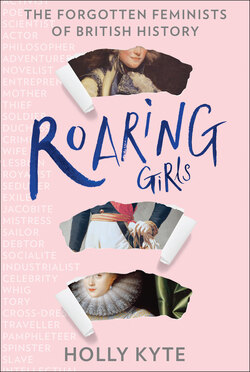Читать книгу Roaring Girls - Holly Kyte - Страница 12
THE ROARING GIRL
ОглавлениеIt is Sunday, 9 February 1612, and a crowd has gathered in the churchyard of old St Paul’s Cathedral to see a woman punished. Her crime is against nature; she has disgraced all womankind with her monstrous acts, and now, before the public and before God, she must admit her shame and be cleansed of guilt.
Barefoot and bare-headed, the woman walks out into the wan morning light, swathed in a white sheet and clutching a long taper. For those who can read it, a placard proclaiming her sin hangs around her neck. As she makes her way unsteadily across the cold flagstones of the yard towards the pulpit and carefully climbs the steps to the platform, the jeers from the crowd rise up and follow her.
From the pulpit stage, she looks out over her audience and sees a swarm of eager faces. They are waiting for the show to start, so when the priest begins his sermon, the woman takes her cue. She drops her eyes, suppresses a smile and does her best to cry.
The woman was Mary Frith, and six weeks before, on Christmas Day 1611, she had been arrested (not for the first time) at St Paul’s
Cathedral for walking the streets of London at night dressed in men’s clothes. The result was a charge of public immorality, and a punishment designed to humiliate, disgrace and correct her: she would do public penance in a white sheet, at the open-air pulpit of St Paul’s Cross within the cathedral grounds,[1] where all could bear witness to her forced repentance and the purification of her soul.
This symbolic ritual was a tried and tested disciplinary measure, already centuries old by 1612, but in this instance, it was a waste of time. The ecclesiastical court, which dealt with all lapses in personal morality, was attempting to shame and reform a woman who would not be shamed or reformed, and in the end, the event was more farcical pantomime than solemn ceremony. The penitent herself, it was observed, regarded her punishment with such merry disdain that she was drunk throughout the proceedings; for her, it seems, this was just another opportunity to play to the crowds. Her priest’s sermon, meanwhile – a lengthy lecture denouncing her sin and calling on her to repent – was so mind-numbingly tedious that most of the audience lost interest and wandered off partway through. Those who stayed, however, were rewarded for their patience with precisely what they had come for: a free performance by ‘Moll Cutpurse’ – one of the most famous, and infamous, women in London.
